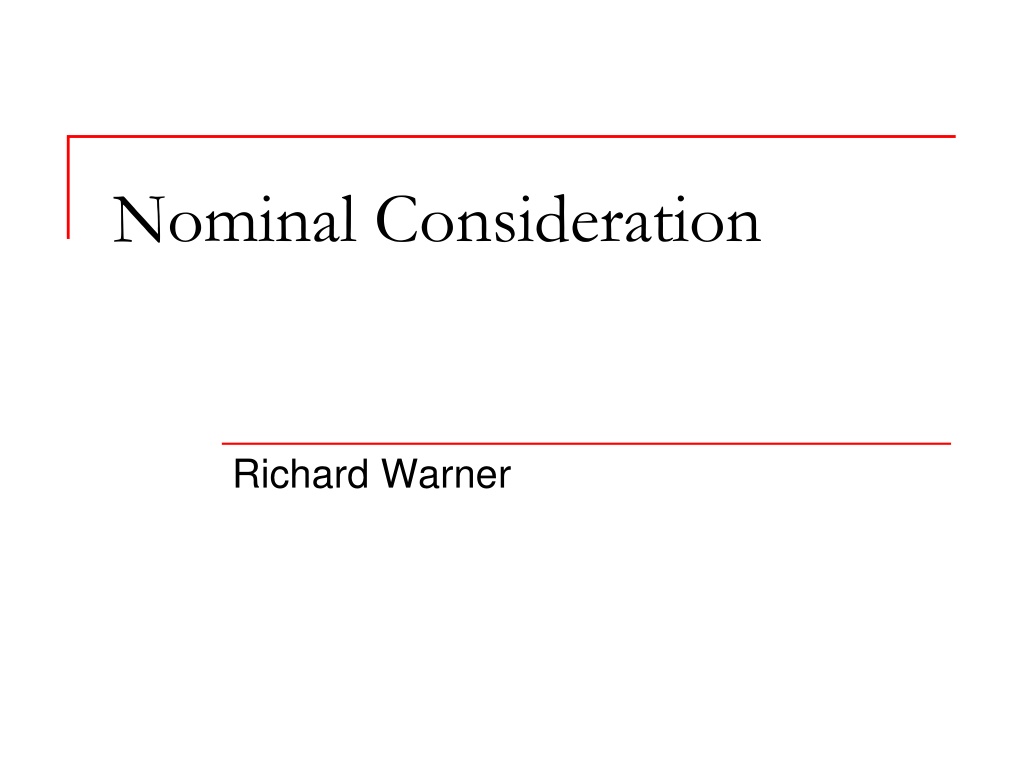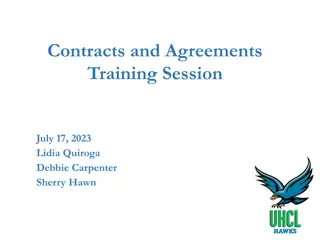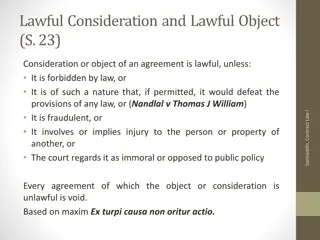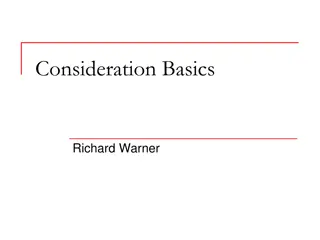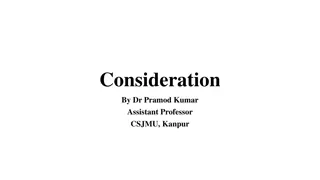Understanding Consideration in Contracts
Exploring different scenarios involving consideration in contracts, from promises of payment for following treatment plans to the enforceability of promises in exchange for minimal commitments. The cases of Linder and Schnell shed light on the importance of reciprocal exchanges to establish valid contracts.
Download Presentation

Please find below an Image/Link to download the presentation.
The content on the website is provided AS IS for your information and personal use only. It may not be sold, licensed, or shared on other websites without obtaining consent from the author. Download presentation by click this link. If you encounter any issues during the download, it is possible that the publisher has removed the file from their server.
E N D
Presentation Transcript
Nominal Consideration Richard Warner
Review: Sarah, Ted, and Tillie Sarah has been hospitalized with anorexia. Her favorite Aunt Tillie and Uncle Ted are visiting her in the hospital. Ted promises to pay her $1000 dollars if Sarah promises to follow her therapist s and nutritionist s eating plan. In response, Sarah promises to do so. Aunt Tillie promises to pay another $100 for each pound she gains. In response, Sarah gains weight. (A) There is consideration for Ted s promise, but not Tillie s. (B) There is consideration for Tillie s promise but not Ted s. (C) There is consideration for both Ted s promise and for Tillie s.
Personal, private Dougherty v. Salt One way exchange Two way exchange Paradigm examples of consideration Commercial
Linder Facts After extensive negotiation, the parties entered a contract with a cancellation clause that gave Mid- Continent the right to cancel the lease with 10 days notice. The issue was whether Linder s promise to rent the gas station is enforceable. She argued it was not because all Mid-Continent promised was to pay ten days rent. She argued that this was insufficient for consideration.
The Linder Argument 1. Consideration has to be given or sought in exchange for the promise. 2. All Linder really got in exchange for her promise to rent the filling station was a commitment to pay 10 days rent. 3. She could not have been seeking that minimal commitment in exchange for her promise. After all, would Linder have signed it he knew deal would only last for 10 days? 4. Therefore, she did not give her promise in exchange for the ten day commitment. 5. Therefore, there was nothing she gave her promise in exchange for. 6. Therefore, there was no consideration for her promise.
Look Familiar? The Schnell v. Nell argument: There is consideration for a promise only if the promisor gave the promise in order to get a promise for performance in exchange. All Schnell really got in exchange for his promise was a penny. He could not have been seeking a penny in exchange for $600. Therefore, he did not give his promise in exchange for the penny. Therefore, there was no consideration for his promise.
The Court On The Cancellation Clause Mid-Continent's option to cancel the lease upon ten days' notice to Mrs. Lindner is not fatal to the validity of the contract. This is not an option by which the lessee may terminate the lease at pleasure and without notice; at the very least the lessee bound itself to pay rent for ten days. Even lesser duties than this are held to be a sufficient consideration to support a contract. Why does the court say this?
Mutuality Of Consideration As the court notes: the use of the term mutuality in this connection is likely to cause confusion and however limited is at best an unnecessary way of stating that there must be a valid consideration. There is a history behind the use of the term that we need not concern ourselves with.
Rules + Decisions are a function of Rules + Facts + Social, political, moral background.
Personal, private Dougherty v. Salt One way exchange Two way exchange Linder belongs here. Paradigm examples of consideration Commercial
Building Businesses on the Web, an executive training program, contracts with Cybersource.com for students to use the web site construction resources of Cybersource. Cybersource promises to provide these services for one year in exchange for Building Businesses publicizing and promoting Cybersource.com. The contract contains this clause: Building Businesses may cancel this contract with 10 days notice. Cybersource claims that its promise to provide these resources is unenforceable. (a) The cancellation clause means that the promise lacks consideration. (b) Cybersource s promise is enforceable. (c) Cybersource s promise is enforceable because courts will not enforce cancellation clauses.
In Re Zappos A hacker attacked Zappos and attempted to download personal information about Zappos customers. Some of the customers sued on statutory and common law theories. The Zappos online agreement contains an arbitration clause, and In Re Zappos concerns the enforceability of that clause.
The Consideration Problem The terms of use agreement said: "We reserve the right to change this Site and these terms and conditions at any time. ACCESSING, BROWSING OR OTHERWISE USING THE SITE INDICATES YOUR AGREEMENT TO ALL THE TERMS AND CONDITIONS IN THIS AGREEMENT, SO PLEASE READ THIS AGREEMENT CAREFULLY BEFORE PROCEEDING."
The Courts Argument In effect, the agreement allows Zappos to hold its customers and users to the promise to arbitrate while reserving its own escape hatch. For example: If a consumer sought to invoke arbitration pursuant to the Terms of Use, nothing would prevent Zappos from unilaterally changing the Terms and making those changes applicable to that pending dispute if it determined that arbitration was no longer in its interest.
The Argument Recast (1) Zappos customers promised to resolve disputes by arbitration. (2) There is consideration for this promise only if they gave it to get a promise or performance in return. (3) What they got was no commitment to arbitration. (4) They did not give their promise to go to arbitration to get no commitment at all. (5) There is nothing else they gave their promise for. (6) Therefore, there is no consideration.
The Standard Practice 1.1 If you choose to use NYTimes.com . . . you will be agreeing to abide by all of the terms and conditions of these Terms of Service between you and The New York Times Company. 1.2 We may change, add or remove portions of these Terms of Service at any time, which shall become effective immediately upon posting . . . by continuing to use this Site, you agree to any changes.
Jerry Lewis has been raising money to help children stricken with terrible illnesses with his telethons for many years. Because of his commitment to the cause, he decided to start calling people on the phone individually. He figured every little bit helps. On one evening he called Steve, a long time fan of Jerry Lewis. Jerry s impassioned plea for support convinced Steve that the children needed urgent attention to save them from these dreaded illnesses. Therefore, Steve signed the following pledge card: In consideration desire to help the children and of others subscribing with me to support this worthy endeavor, I pledge the sum of $1,000. Is there consideration for Steve s promise? (A) Yes, because his desire to help the children serves as valuable consideration. (B) Yes, because Jerry Lewis commitment to children serves as valuable consideration. (C) Yes, because the requirement that other s will subscribe to this cause serves as consideration. (D) None of the above are correct.
Review: The Bracelet 1 Smith calls his wife at her work and invites her to lunch. She says she is really in the mood just to grab a quick lunch at the cafeteria in her building. Smith overcomes her reluctance by promising to buy her, immediately after lunch, the expensive bracelet that she has been wanting. Between the phone call and lunch, Smith opens his visa bill and, stunned by the balance due decides not to buy the bracelet. He does not, however, inform his wife of this decision until after lunch. Is there consideration for Smith s promise? (a) Yes (b) No
Review: Bracelet 2 Smith calls his wife Linda at her work. He says, "I really need your expert advice on a project. You know that emerald bracelet you have been wanting, give me your advice over lunch and I will buy it for you. I promise." Linda says, "OK, give me the bracelet and I won't bill you." (She normally charges $200/hour, and she has typically billed Smith for business advice given at lunch in the past.) Linda shows up at lunch; advises Smith, but Smith refuses to buy the bracelet. Is there consideration for Smith s promise? (a) Yes (b) No
Conditional Promises I promise to pay you $1 million to charter The Harold Krent, a cargo ship; you promise to charter the ship to me if you succeed in buying it. If you buy it, you are committed to chartering it to me. Note: The promise is not conditional on my subjective state of mind, but on a verifiable external event.
Conditional Promises That Are Illusory Example: I promise to sell you software for $99, and you promise to buy if you want it. Are you committed? No.
